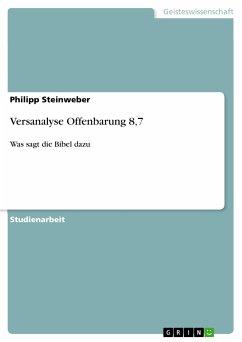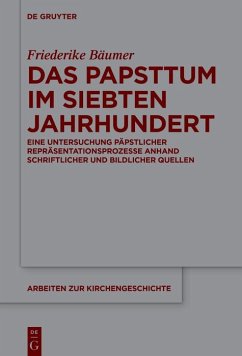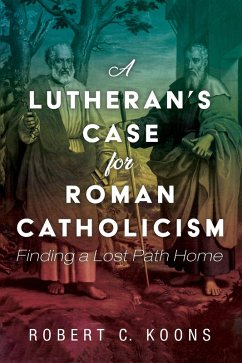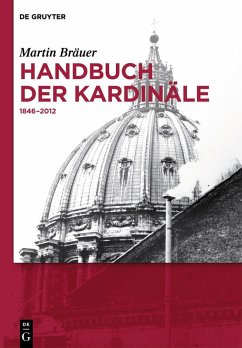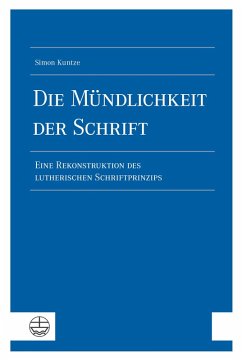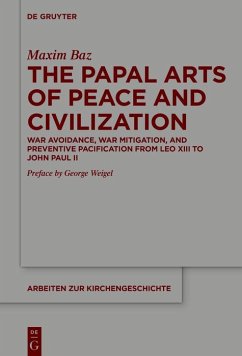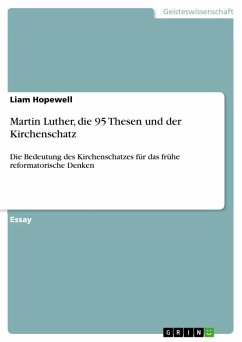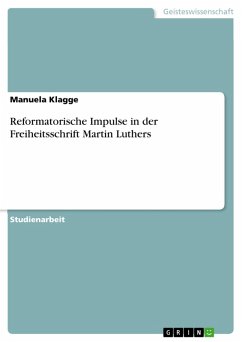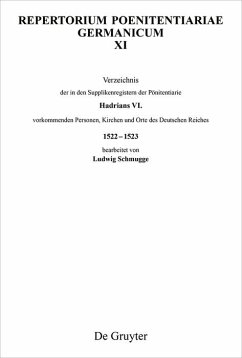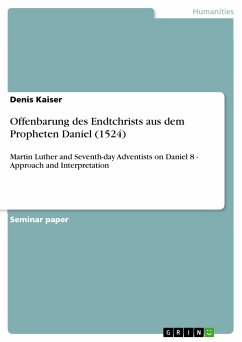
Offenbarung des Endtchrists aus dem Propheten Daniel (1524) (eBook, ePUB)
Martin Luther and Seventh-day Adventists on Daniel 8 - Approach and Interpretation
Sofort per Download lieferbar
Statt: 17,95 €**
15,99 €
inkl. MwSt. und vom Verlag festgesetzt.
**Preis der gedruckten Ausgabe (Broschiertes Buch)
Alle Infos zum eBook verschenkenWeitere Ausgaben:

PAYBACK Punkte
0 °P sammeln!
Seminar paper from the year 2008 in the subject Theology - Historic Theology, Ecclesiastical History, grade: 1.0, University of St Andrews (Seventh-day Adventist Theological Seminary), course: Protestant Theological Heritage, language: English, abstract: Statement of the Problem: Andrews University holds in its Center for Adventist Research a considerable collection of tracts and pamphlets of the Reformation period. Some of these writings still wait for a more thorough investigation than has been possible in the past. One of these tracts that has not yet received the due attention is Martin Lu...
Seminar paper from the year 2008 in the subject Theology - Historic Theology, Ecclesiastical History, grade: 1.0, University of St Andrews (Seventh-day Adventist Theological Seminary), course: Protestant Theological Heritage, language: English, abstract: Statement of the Problem: Andrews University holds in its Center for Adventist Research a considerable collection of tracts and pamphlets of the Reformation period. Some of these writings still wait for a more thorough investigation than has been possible in the past. One of these tracts that has not yet received the due attention is Martin Luther's Offenbarung des Endtchrists: auß dem Propheten Daniel, wider Catharinum (1524), a German translation of the Latin Ad librum eximmii Magistri Nostri Magistri Ambrosii Catharini, defensoris Silvestri Prieratis acerrimi, responsio (1521). This book was written to Ambrosius Catharinus, and deals with the prophecy of Dan 8 on the manifestation of the End-Christ (the eschatological Antichrist). In the course of this paper I will refer to it simply as the Responsio. This Streitschrift could, however, be especially interesting for Seventh-day Adventists since their origin and message is undoubtedly connected to the interpretation of the prophecies of Daniel. Purpose of the Research The aim of this study is to get a better understanding of the historical background of Luther's Responsio and how he interpreted the prophecies of Dan 8 in that book. Further, I want to highlight parallels and diversities between Luther's approach and the Adventist approach to the prophecies of the Dan 8. Methodology First, the primary and secondary sources will be examined in order to comprehend the historical setting, in which the book was written as well as to identify the reasons for Luther to write his book. Its reception will be recognized in its translation into other languages, in the reaction of its recipient and of other contemporaries. Second, the content of the tract will be summarized with a focus on Luther's interpretation of and his approach to the prophetic text in order to understand which methods he used for the interpretation. Finally, Luther's interpretation, approach, and methods will be compared to the way modern Adventist scholars interpret the prophetic texts of the Bible to see similarities as well as differences, followed by an evaluation of both, Lutheran and Adventist prophetic interpretation.
Dieser Download kann aus rechtlichen Gründen nur mit Rechnungsadresse in A, B, BG, CY, CZ, D, DK, EW, E, FIN, F, GR, HR, H, IRL, I, LT, L, LR, M, NL, PL, P, R, S, SLO, SK ausgeliefert werden.




